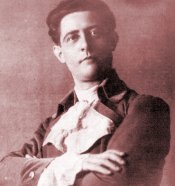
18 Dec 2005
MASSENET: Werther
Werther, drame lyrique en 4 actes et 5 tableaux
Music composed by Jules Massenet. Libretto by Edouard Blau, Paul Milliet and Georges Hartmann based on Die Leiden des jungen Werther by Johann Wolfgang von Goethe
Andromaca: Dramma per musica in three acts.
Ermione: Azione tragica in two acts.
Ippolito ed Aricia: Tragedia in five acts.
Idomeneo: Opera seria in three acts.
Paride ed Elena: Dramma per musica in five acts.
Orphée: Opera in four acts.
Music composed by Christoph Willibald Gluck (arranged by Hector Berlioz, 1859). Libretto by Ranieri de' Calzabigi
Alceste, ou Le triomphe d’Alcide: Tragédie en musique in a prologue and five acts.
Alceste: Tragédie opéra in three acts.
Medea: Melodramma tragico in three acts.
Oedipe à Colone: Tragédie lyrique in three acts.
Elektra: Tragedy in one act.
Fedra: Dramma per musica in two acts.
Les Troyens: Grand opéra in five acts.
Die Meistersinger von Nürnberg: Music drama in three acts.
Ariadne auf Naxos, Oper with a prologue and one act. Music composed by Richard Strauss. Libretto by Hugo von Hofmannsthal.
Der Schauspieldirektor [The Impresario], Singspiel in one act, K486.
Divertimento teatrale in one act.
Andrea Chénier, an opera in four acts.
La figlia del reggimento [La Fille du régiment (‘The Daughter of the Regiment’)], Opéra comique in two acts.
L’elisir d’amore, Melodramma giocoso in two acts.

Werther, drame lyrique en 4 actes et 5 tableaux
Music composed by Jules Massenet. Libretto by Edouard Blau, Paul Milliet and Georges Hartmann based on Die Leiden des jungen Werther by Johann Wolfgang von Goethe
First performance: 16 February 1892 at the Hofoper, Vienna.
Principal characters
| Werther, 23-years old | Tenor |
| Albert, 25-years old | Baritone |
| Le Bailli, 50-years old | Baritone or bass |
| Schmidt, friend of Bailli | Tenor |
| Johann, friend of Bailli | Baritone or bass |
| Bruhlmann, young man | Coryphée |
| Charlotte, daugher of Bailli, 20-years old | Mezzo-soprano |
| Sophie, her sister, 15-years old | Soprano |
| Katchen, young girl | Coryphée |
| Six children: Fritz, Max, Hans, Karl, Gretel, Clara | Soprani or children's voices |
Synopsis
Act I
On the outskirts of Frankfurt, July 178_.
On the terrace of the house of the bailiff, children are practicing Christmas carols. Sophie, the bailiff's fifteen-year-old daughter, looks on while her older sister, Charlotte, prepares for a party. The guests arrive. Among them is the young dreamer Werther ("Je of it sais him je veille"), whom the bailiff introduces to Charlotte. While all are at the dance, Sophie is at home alone when Albert, who is engaged to Charlotte, returns from a long trip. He is greatly disturbed that Charlotte has gone to a dance with another. But Sophie reassures him — his beloved has always thought of him ("Elle me aime"). The two depart, whereupon Werther and Charlotte reenter. Werther declares to her his love, but Charlotte tells him of her promise to her dying mother to marry Albert. Werther, although desperate, doesn't oppose ("The faut nous séparer").
Act II
The following September in the plaza of Wetzlar.
Albert and Charlotte have been married for three months and their friends toast their union. The unhappy Werther attends. Sophie arrives, who is in love with Werther, asks him to dance; but the invitation is rejected. Werther wants to talk to Charlotte. He approaches her to declare his love once more. But she responds by recommending that he leave for a few months and return on Christmas. Werther begins to think that only death can free him from his unhappiness. He again refuses Sophie's invitation to the dance.
Act III
Christmas Eve in the living room of Albert's house.
Charlotte is uneasy as she rereads a letter of Werther. Sophie asks her if she were sad because of the absence of Werther ("Je vous écris"). Charlotte begins to weep. Werther arrives. While he is reading her some verses of Ossian, he kisses her. They embrace, but Charlotte then runs away confining herself in a room ("Pourquoi me réveiller"). Werther leaves the house. He now knows that there is no happiness for him. Shortly thereafter he sends a note to Albert to ask him to loan him his pistols to take with him on a trip. Charlotte realizes the truth and hurries to Werther's home.
Act IV
It is Christmas night.
Werther lies dying in his study. Upon hearing the voice of Charlotte, he is revived for an instant. He asks for forgiveness and for a proper burial ("Là-bas, au fond du cimitière"). He dies in Charlotte's arms as she confesses the truth — she has always loved him. She expresses her regret at having sacrificed her own true feelings to an oath. Children are heard from afar singing Christmas carols.